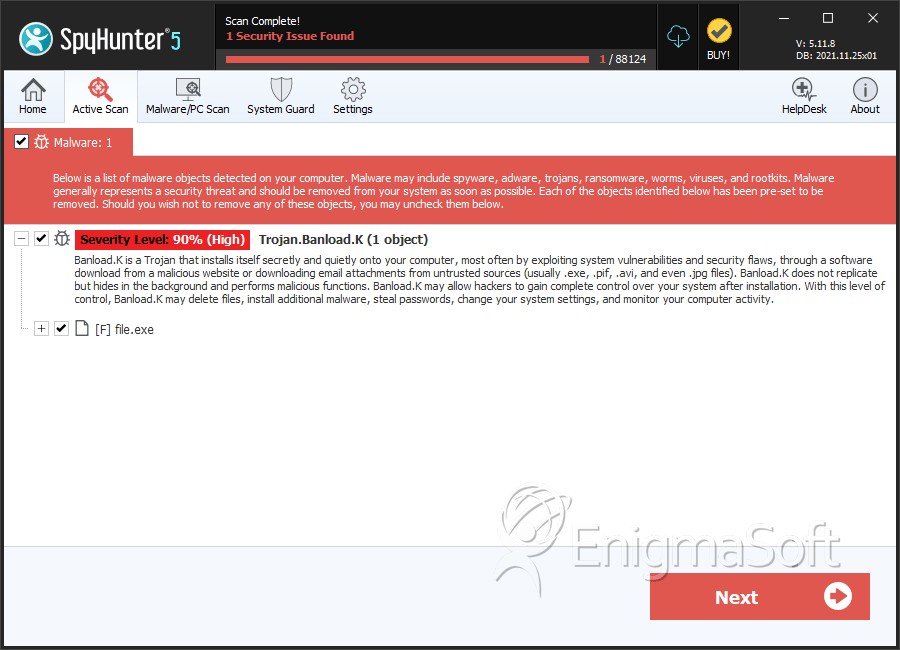Trojan.Agent/Gen-Banload
Threat Scorecard
EnigmaSoft Threat Scorecard
EnigmaSoft Threat Scorecards are assessment reports for different malware threats which have been collected and analyzed by our research team. EnigmaSoft Threat Scorecards evaluate and rank threats using several metrics including real-world and potential risk factors, trends, frequency, prevalence, and persistence. EnigmaSoft Threat Scorecards are updated regularly based on our research data and metrics and are useful for a wide range of computer users, from end users seeking solutions to remove malware from their systems to security experts analyzing threats.
EnigmaSoft Threat Scorecards display a variety of useful information, including:
Ranking: The ranking of a particular threat in EnigmaSoft’s Threat Database.
Severity Level: The determined severity level of an object, represented numerically, based on our risk modeling process and research, as explained in our Threat Assessment Criteria.
Infected Computers: The number of confirmed and suspected cases of a particular threat detected on infected computers as reported by SpyHunter.
See also Threat Assessment Criteria.
| Ranking: | 16,411 |
| Threat Level: | 90 % (High) |
| Infected Computers: | 196 |
| First Seen: | August 30, 2012 |
| Last Seen: | June 21, 2023 |
| OS(es) Affected: | Windows |
Trojan.Agent/Gen-Banload is a Trojan dropper designed to install a backdoor Trojan on the victim's computer. Like most Trojans, Trojan.Agent/Gen-Banload cannot spread on its own and usually requires a social engineering approach or other threats in order to attack a computer. Trojan.Agent/Gen-Banload has been linked to a series of unsafe email messages where criminals impersonate legitimate security companies in order to deliver threats. Because of this, ESG team of malware researchers strongly advises never to open email attachments from an unknown source. These are a common way of distributing threats, often disguised as harmless files or packed in a compressed ZIP or RAR archive. If you believe you have been exposed to the Trojan.Agent/Gen-Banload, ESG malware researchers strongly advise scanning your computer with a reliable, fully-updated malware scanner.
Table of Contents
The Email Scam Used to Distribute Trojan.Agent/Gen-Banload
Malware researchers have uncovered a spam campaign that uses logos and spoofed email addresses for popular anti-virus manufacturers. These email messages contain an attached file that is the Trojan.Agent/Gen-Banload in disguise. This spam email campaign is not particularly widespread, and the security companies being impersonated in these unsafe email messages include Verisign, Sophos, Symantec and F-Secure. Opening the attached file infects the victim's computer with the Trojan.Agent/Gen-Banload. Once installed, this Trojan connects to various suspicious URLs in order to retrieve other threats as well as receive instructions from its creators.
How to Avoid Been Attacked by Trojan.Agent/Gen-Banload
There are several things you can do to avoid becoming a victim of a Trojan.Agent/Gen-Banload attack. The most important step you can take is making sure that you follow safe browsing guidelines when going online. This means that you should never download files from unknown sources, particularly if they are contained in unsolicited email messages and that you should be particularly careful about clicking on unknown links or visiting unknown websites. Certain Web pages are considered unsafe and may put you at a higher risk for infection with threats similar to Trojan.Agent/Gen-Banload. Avoid websites with pornographic material or content that infringes copyright law. You should also avoid downloading any content from these kinds of websites. While Trojan.Agent/Gen-Banload itself is distributed via unreliable email messages, similar threats are also popularly disguised as fake video codecs on pornographic websites or as fake media players on file-sharing Web sites and popular movie torrent downloads.
Aliases
15 security vendors flagged this file as malicious.
| Anti-Virus Software | Detection |
|---|---|
| Ikarus | Virus.Win32.VB.bb |
| AVG | Downloader.VB.AXQ |
| eWido | Downloader.Banload.ihm |
| Microsoft | Worm:Win32/SillyFDC.I |
| eTrust-Vet | Win32/Fijo.A |
| Sophos | Mal/VB-F |
| AntiVir | TR/Dldr.Banload.ihm.7 |
| DrWeb | Trojan.DownLoader.56620 |
| BitDefender | Win32.Worm.VB.NUH |
| Kaspersky | Trojan-Downloader.Win32.Banload.ihm |
| ClamAV | Trojan.Downloader-28731 |
| Avast | Win32:Rootkit-gen |
| Symantec | W32.SillyDC |
| F-Prot | W32/Downldr2.BGDB |
| McAfee | Generic VB.b |
SpyHunter Detects & Remove Trojan.Agent/Gen-Banload

File System Details
| # | File Name | MD5 |
Detections
Detections: The number of confirmed and suspected cases of a particular threat detected on
infected computers as reported by SpyHunter.
|
|---|---|---|---|
| 1. | file.exe | dcc11d0d75452f95926efc70caf5a654 | 0 |
| 2. | file.exe | d2ebdd1b04239b17ddc4975108255eed | 0 |


Submit Comment
Please DO NOT use this comment system for support or billing questions. For SpyHunter technical support requests, please contact our technical support team directly by opening a customer support ticket via your SpyHunter. For billing issues, please refer to our "Billing Questions or Problems?" page. For general inquiries (complaints, legal, press, marketing, copyright), visit our "Inquiries and Feedback" page.